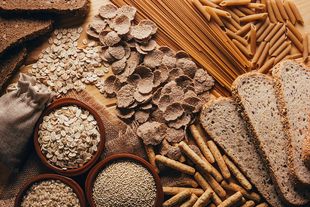Which dietary factors play a role in the prevention of type 2 diabetes? - And what is the validity of these study results? This is now summarized in a scientific review in the British Medical Journal. The research team led by Dr. Sabrina Schlesinger, head of the junior research group Systematic Reviews at the German Diabetes Center, conducted a comprehensive literature search on the role of diet and type 2 diabetes incidence. For this purpose, all meta-analyses (= summary of studies on a research question with a statistical consideration of the results) on this topic were systematically compiled and the validity of the study results evaluated. The following diets (e.g. Mediterranean diet, diet with reduced carbohydrate content), foods (e.g. whole grain products, fruit or vegetables), beverages (e.g. beverages containing sugar and coffee), nutrients (e.g. carbohydrates, fats), minerals (e.g. magnesium, iron) and vitamins (e.g. vitamin D, vitamin C) were examined.
A total of 153 study results identifying the association between dietary factors and type 2 diabetes were identified. High evidence of a reduced risk of diabetes has been demonstrated for high consumption of whole grain products, especially cereal fibers, and lower consumption of sugar-sweetened drinks and red meats, especially processed meats such as bacon. A moderate value was determined for 22%, a low for 60% and a very low for 14% of the correlations.
"This systematic review shows that the association between diet and type 2 diabetes has already been investigated in numerous studies and that diet plays a role in the prevention of type 2 diabetes. Nevertheless, there is uncertainty about the validity of many of these associations," explained Dr. Sabrina Schlesinger. Methodological aspects of the original studies pose a possible limitation. Since these were exclusively observational studies, certain sources of bias cannot be completely ruled out. "Other well-designed and validated studies investigating the relationship between dietary factors and type 2 diabetes are needed," said Dr. Sabrina Schlesinger.

